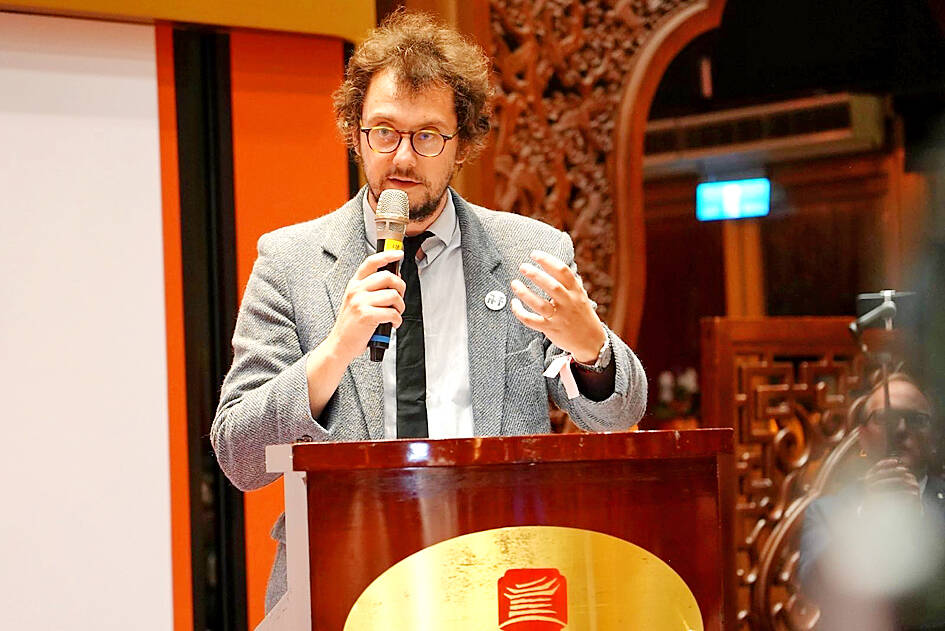Reporters Without Borders (RSF) director-general Thibaut Bruttin praised Taiwan’s free media in an interview last week, but added that work still needed to encourage more editorial independence in local newsrooms.
“Taiwan can be proud of its free media ... [but] we think it’s important to go to the next step,” Bruttin said in an interview in Taipei on Friday.
Bruttin lauded Taiwan as a “role model” for press freedom in Asia and said he hoped that it would continue to “build up its model” and “show the way to other countries in the region.”

Photo courtesy of RSF via CNA
In the 2024 World Press Freedom Index released by RSF in May, Taiwan moved up eight positions from last year to 27th in the rankings out of 180 countries and regions, and ranked second in Asia after East Timor.
“Taiwan really is one of the test cases for the robustness of journalism in the world,” he said, reflecting on the nation’s transformation from an authoritarian regime that censored information into a vibrant democracy that fights disinformation.
However, Taiwan’s free press is not without criticism, Bruttin said, calling for media reforms to address the lack of editorial independence in newsrooms, which he said had undermined the media’s credibility.
Bruttin, who visited Taiwan for the first time as the head of RSF from Monday to Friday last week to celebrate the seventh anniversary of the non-governmental organization’s Asia-Pacific office in Taipei, described the “credibility deficit” in a recent op-ed as “a real Achilles heel of Taiwanese democracy.”
“It’s good that the media is free, but freedom is not necessarily something that sums up what journalism is,” he said. “At RSF, we fight for free, independent and pluralistic media.”
Taiwan must work on preventing its journalism industry from being “weaponized” against democracy, Bruttin said, warning against “narratives that are obeying vested interests, either commercial or ideological, or geopolitical.”
He said the polarized and politicized media has resulted in a credibility crisis in journalism in Taiwan, citing the Digital News Report issued by the Reuters Institute for the Study of Journalism.
The report said that in Taiwan, only 33 percent of 2,011 respondents said they trusted most news most of the time.
RSF has called on the government to increase funding for public media, adopt a “coregulation” mechanism to encourage editorial independence and provide incentives to media outlets committed to respecting journalistic ethics, among other measures.
Bruttin said RSF would continue using Taiwan as an Asia-Pacific hub for its monitoring and advocacy work in 33 countries and regions in East Asia, Southeast Asia and Oceania.
One of the main issues is to continue calling for the release of Hong Kong media mogul and pro-democracy activist Jimmy Lai (黎智英), who has been in detention since December 2020 for his alleged involvement in democracy protests that rocked the territory a year earlier.
“We need to make people aware of the fact that they are keeping locked in solitary confinement a 70-something media executive who just had one of the freest, most popular Hong Kong dailies,” he said.
Lai, 76, is facing charges of collusion with foreign powers under the draconian National Security Law introduced by Beijing in June 2020 and could face life imprisonment.

Taiwan is stepping up plans to create self-sufficient supply chains for combat drones and increase foreign orders from the US to counter China’s numerical superiority, a defense official said on Saturday. Commenting on condition of anonymity, the official said the nation’s armed forces are in agreement with US Admiral Samuel Paparo’s assessment that Taiwan’s military must be prepared to turn the nation’s waters into a “hellscape” for the Chinese People’s Liberation Army (PLA). Paparo, the commander of the US Indo-Pacific Command, reiterated the concept during a Congressional hearing in Washington on Wednesday. He first coined the term in a security conference last

A magnitude 4.3 earthquake struck eastern Taiwan's Hualien County at 8:31am today, according to the Central Weather Administration (CWA). The epicenter of the temblor was located in Hualien County, about 70.3 kilometers south southwest of Hualien County Hall, at a depth of 23.2km, according to the administration. There were no immediate reports of damage resulting from the quake. The earthquake's intensity, which gauges the actual effect of a temblor, was highest in Taitung County, where it measured 3 on Taiwan's 7-tier intensity scale. The quake also measured an intensity of 2 in Hualien and Nantou counties, the CWA said.

The Overseas Community Affairs Council (OCAC) yesterday announced a fundraising campaign to support survivors of the magnitude 7.7 earthquake that struck Myanmar on March 28, with two prayer events scheduled in Taipei and Taichung later this week. “While initial rescue operations have concluded [in Myanmar], many survivors are now facing increasingly difficult living conditions,” OCAC Minister Hsu Chia-ching (徐佳青) told a news conference in Taipei. The fundraising campaign, which runs through May 31, is focused on supporting the reconstruction of damaged overseas compatriot schools, assisting students from Myanmar in Taiwan, and providing essential items, such as drinking water, food and medical supplies,

New Party Deputy Secretary-General You Chih-pin (游智彬) this morning went to the National Immigration Agency (NIA) to “turn himself in” after being notified that he had failed to provide proof of having renounced his Chinese household registration. He was one of more than 10,000 naturalized Taiwanese citizens from China who were informed by the NIA that their Taiwanese citizenship might be revoked if they fail to provide the proof in three months, people familiar with the matter said. You said he has proof that he had renounced his Chinese household registration and demanded the NIA provide proof that he still had Chinese